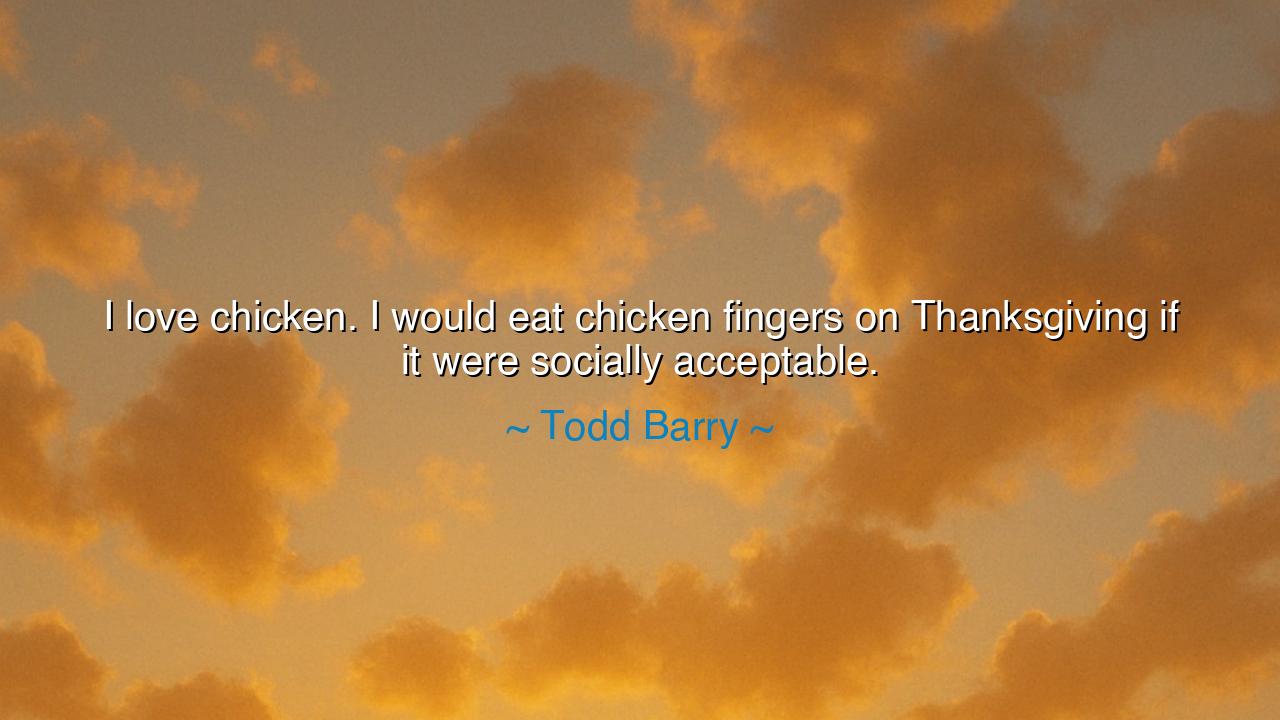
I love chicken. I would eat chicken fingers on Thanksgiving if
I love chicken. I would eat chicken fingers on Thanksgiving if it were socially acceptable.






"I love chicken. I would eat chicken fingers on Thanksgiving if it were socially acceptable." In this humorous reflection, Todd Barry touches on something deeper than appetite. Beneath the playful tone lies a commentary on tradition, individuality, and conformity. Thanksgiving, more than most holidays, carries a weight of expectation—turkey upon the table, stuffing in the bowls, pie waiting at the end. To long for chicken fingers at such a sacred meal is not merely about preference; it is about the tension between what we truly desire and what society deems proper.
The origin of this humor is rooted in the very nature of communal ritual. Festivals and feasts have always relied on shared symbols—the lamb at Passover, the bread and wine at Eucharist, the turkey at Thanksgiving. These symbols bind communities together, reminding them of their history and shared values. Yet, they also impose limits, sometimes stifling personal expression. Barry’s jest hints at this paradox: he loves chicken, yet feels bound by tradition to eat turkey, lest he be judged. His yearning exposes the unspoken truth that even joy can be constrained by social expectation.
History gives us a telling example in the story of Thanksgiving itself. At that first feast in Plymouth, there was no single, fixed menu. Early accounts mention venison, fowl, fish, and maize. Turkey did not yet reign supreme. The idea of one “proper” food came later, crystallized by culture and reinforced by repetition. Thus, Barry’s joke reminds us that what seems eternal—turkey as the king of Thanksgiving—is in fact a construct, shaped by time. In another era, perhaps chicken fingers might have been the chosen dish of memory.
His humor also unveils the deeper human struggle: the desire to be authentic against the pressure to conform. Many throughout history have wrestled with this conflict. Consider Socrates, who chose to drink the hemlock rather than betray his convictions, even when society demanded otherwise. Though Barry speaks lightly of food, the echo of this eternal struggle is present. He reveals, through jest, the cost of going against the grain, even for something as small as one’s plate. What we eat is never only about hunger; it is about identity.
There is also a lesson about humility here. To admit one’s love for something as simple as chicken fingers in the midst of a grand feast is to embrace authenticity, even if it seems foolish. It is a reminder that joy is not always found in the grand and expected, but often in the small and overlooked. Just as a child might love the crust of bread more than the fine meal it accompanies, so too are our hearts bound to peculiar loves that cannot always be explained. These small desires, honored, make us who we are.
The lesson for future generations is this: traditions are sacred, but they should never silence the voice of the individual. Honor the turkey, but do not forget the chicken. Partake in the rituals that bind the community, but also cherish the small loves that make your soul unique. There is wisdom in balance: respect the feast while making room for joy in your own way.
Practical action follows naturally. When you gather at the table, honor tradition, but allow room for personal touches. If someone longs for something different, let them bring it. Let no one feel ashamed for their simple pleasures, for gratitude is not measured by what is on the plate, but by the spirit in which it is received. True thanksgiving is found not in uniformity, but in shared joy.
Thus, Todd Barry’s jest, though wrapped in laughter, carries the echo of timeless wisdom: authenticity and gratitude must dwell side by side. Whether turkey or chicken fingers, what matters most is the heart that gives thanks, the love that binds the gathering, and the courage to honor both tradition and individuality. In this balance lies the fullness of the feast.






AAdministratorAdministrator
Welcome, honored guests. Please leave a comment, we will respond soon